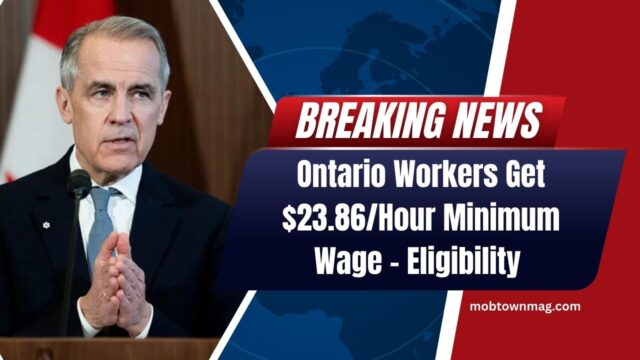Starting October 1, 2025, Ontario’s official minimum wage will rise to $17.60 per hour, bringing a welcome pay bump to thousands of workers across the province.
While some headlines have been buzzing about a $23.86/hour rate, that figure isn’t the legal minimum—it’s a living wage estimate that varies by region and isn’t enforceable by law.
This update affects not just general employees, but also students, homeworkers, and wilderness guides, each with their own adjusted pay rates.
In this article, we break down the exact rates, eligibility rules, and real-world impact of the change, so you know exactly what to expect in your paycheque this fall.
Ontario workers and employers—take note! As of October 1, 2025, the official minimum wage in Ontario will rise to $17.60 per hour, not the often-circulated $23.86 figure you may have seen floating around.
That higher number likely stems from living wage estimates, which are voluntary benchmarks, not legally enforced standards.
Below, you’ll find every detail, fact, and figure broken out clearly:
- The exact wage categories and who they apply to
- A structured table summarizing them
- Insights into eligibility, financial impact, and why the $23.86 idea is misleading
- 3 FAQs to address the most common questions
- A solid conclusion to wrap it all up
Ontario Minimum Wage Changes Effective October 1, 2025
Ontario adjusts minimum wage annually, based on inflation and economic indicators. For October 1, 2025, here are the official rates by category:
- General minimum wage: $17.60/hour — applies to the vast majority of employees across Ontario.
- Student minimum wage: $16.60/hour — applies to workers under 18 who work 28 hours or less per week during school periods, or during school breaks/holidays. If they exceed 28 hours during a school week, the general rate applies.
- Homeworkers: $19.35/hour — for employees (not independent contractors) who perform paid work from their residence.
- Hunting, fishing & wilderness guides:
- $88.05/day if working less than 5 consecutive hours in a day
- $176.15/day if working 5 or more hours (consecutive or not) in a day
These are minimums—employers are free to pay more, and many in higher-cost areas often do.
Ontario Minimum Wage Rates (Oct 1, 2025 – Sep 30, 2026)
| General minimum wage | $17.60/hour | Most employees in Ontario | Indexed annually to inflation |
| Student minimum wage | $16.60/hour | Workers under 18, ≤28 hours/wk during school periods | Exceed 28 hours → general rate applies |
| Homeworkers | $19.35/hour | Employees working from home | Not applicable to independent contractors |
| Guides (<5 hrs/day) | $88.05/day | Hunting/fishing/wilderness guides | For less than 5 consecutive hours |
| Guides (≥5 hrs/day) | $176.15/day | Hunting/fishing/wilderness guides | For 5 or more hours in a day (consecutive or not) |
Why the $23.86/hour Figure Is Misleading
- The $23.86 number is not an official minimum wage.
- It likely comes from living wage estimates, which aim to capture the cost of basic necessities in a region—but are not legally enforceable.
- Living wage estimates vary by location: some areas in Ontario have estimates around $20, while others—like parts of the Greater Toronto Area—stretch into the mid-$20s. That’s why no single figure like $23.86 applies province-wide.
Eligibility: Who Gets Which Rate?
The Employment Standards Act in Ontario mandates these minimums for most employees. Here’s a breakdown:
- General employees: get $17.60/hour
- Students (<18) working limited hours: $16.60/hour
- Homeworkers (as employees): $19.35/hour
- Wilderness guides: $88.05 or $176.15 per day, depending on hours worked
- Federal-regulated workers: Banks, airlines, etc., must follow whichever is higher—the federal or provincial minimum (typically the provincial rate)
- Independent contractors: Usually not covered by minimum wage laws. If you suspect misclassification, you may still have rights—clarify with a specialist.
The Impact on Workers & Employers
Workers
- Higher base pay means better protection against rising living costs.
- Students benefit from a specific youth rate, while homeworkers get compensation that recognizes their work-from-home context.
- Guides get fair daily minimums based on their unique work setup.
Employers
- The annual adjustment provides predictability, aiding in budget forecasts and payroll planning.
- Compliance means updating payroll systems by October 1, 2025 and ensuring correct application of student hour limits and guide day-rates.
Living Wage vs. Minimum Wage
While the minimum wage is a legal baseline, the living wage is a voluntary benchmark—what families need to afford basic necessities like housing, food, and transportation.
Many Ontario communities use living wage figures, which often exceed the legal minimum to reflect real costs of living. Some businesses choose to pay living wages to support employees and demonstrate social responsibility.
Here’s what really matters: Ontario’s minimum wage increases to $17.60/hour as of October 1, 2025. Other categories like students, homeworkers, and guides also have specified minimums.
The $23.86/hour figure you might have seen is not an official wage—it comes from voluntary living wage estimates that vary by region.
Always base your decisions on the official minimums—they’re law—while living wage metrics offer context on what’s often needed to truly make ends meet.
FAQs
Is the minimum wage really going to be $23.86/hour in Ontario?
No. The legal minimum wage in Ontario will be $17.60/hour starting October 1, 2025. The $23.86 figure represents a living wage estimate in some regions, not the legal requirement.
I’m a student under 18 and work part-time. What rate applies to me?
If you’re under 18 and work 28 hours or less per week during school sessions (or during breaks), you’ll be paid at least $16.60/hour. If you work more than 28 hours per school week, you must be paid the general minimum wage of $17.60/hour.
I work from home for a company—am I covered by minimum wage?
Yes—if you are classified as an employee (not an independent contractor), your minimum wage is $19.35/hour starting October 1. If you’re considered an independent contractor, typical minimum wage protections generally don’t apply—it’s worth confirming your classification if you’re unsure.




